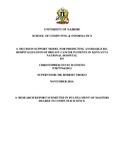| dc.description.abstract | The study is about a clinical predictive model meant to support clinical decision-making of
oncologists, which would have an immense potential benefit to their performance, provision of
quality care and, better patient outcomes. It is accepted that one can take better care of a patient
if one has superb knowledge (theory) about the clinical matters in question. For example, it could
be said that with more information and knowledge, a clinician has a better chance of solving a
clinical problem in favor of the patient, the hospital and himself. However, the problem
nowadays is that global knowledge about a topic is often overwhelming for a clinician to process
at the point of care or in urgent situations.
The study’s predictive model incorporates patient-specific data which are well-structured and
current knowledge base or evidence-based guidelines, thus serving the clinician by enhancing
throughout use of her clinical decision-making process. Such support by this clinical model on
basic cognitive processes involved in medical thinking to some extent relieves the clinician and
provides him with new, better-formed and possibly superior methods to take best care of the ill.
The clinical decision model characteristics’ are related to clinical effectiveness, functionality,
error prevention, potential for acceptance in the clinical world, system portability, cost
effectiveness among others. It is important to fully understand its development and modalities
adopted.
In this research study,6 samples records of breast cancer patients who were re-hospitalized in
year (2009 to 2013), 30 were used. A Likert scaled questionnaire that was answered by
clinicians, and 14 interview questionnaires on re-hospitalized patients are analyzed and the
resulting information is used to develop a predictive decision support model.
The finished model is used to support clinicians decide upfront on vulnerable patients who are
likely to be re-hospitalized. The developed decision tree model was validated by the test dataset
which had been split from the same data that had been collected. The validated decision
prediction model demonstrates sensitivity of 68.714%, a specificity of 71.42% and an area under
the receiver operating characteristic curve of 0.908 for any prediction done.
This research study involved a real life application problem of predicting breast cancer patients
to be re-hospitalized, not to be re-hospitalized or both cases.
Since the clinical decision support prediction model uses three sources of data from the hospital,
patients to be discharged can be readily stratified into risk groups. This simple prediction model
for evaluating patients before discharging may provide clinicians with a practical tool for
counseling families and making management decisions just before patient discharge. | en_US |

